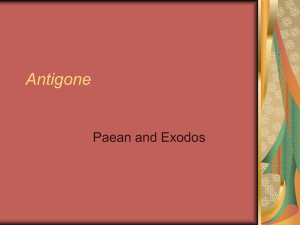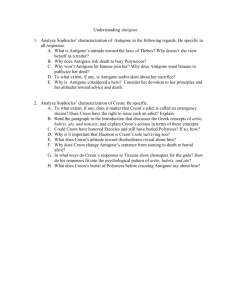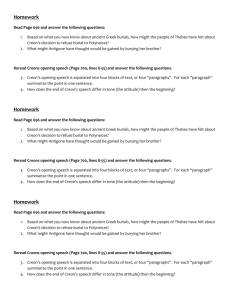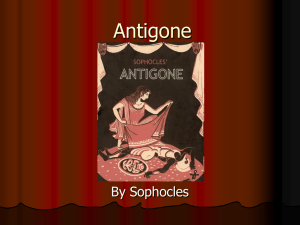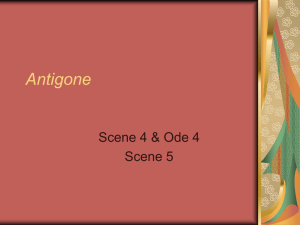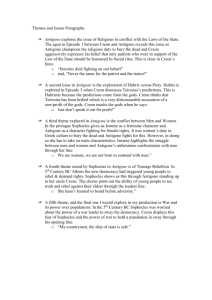Creon revise essay.doc
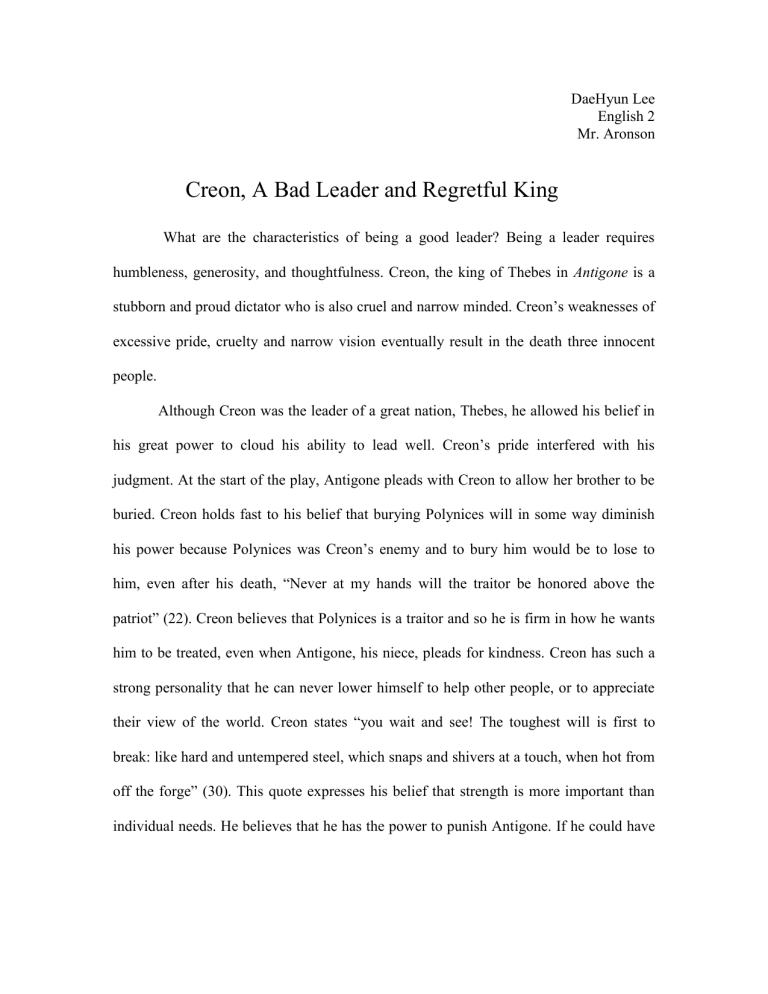
Creon, A Bad Leader and Regretful King
DaeHyun Lee
English 2
Mr. Aronson
What are the characteristics of being a good leader? Being a leader requires humbleness, generosity, and thoughtfulness. Creon, the king of Thebes in Antigone is a stubborn and proud dictator who is also cruel and narrow minded. Creon’s weaknesses of excessive pride, cruelty and narrow vision eventually result in the death three innocent people.
Although Creon was the leader of a great nation, Thebes, he allowed his belief in his great power to cloud his ability to lead well. Creon’s pride interfered with his judgment. At the start of the play, Antigone pleads with Creon to allow her brother to be buried. Creon holds fast to his belief that burying Polynices will in some way diminish his power because Polynices was Creon’s enemy and to bury him would be to lose to him, even after his death, “Never at my hands will the traitor be honored above the patriot” (22). Creon believes that Polynices is a traitor and so he is firm in how he wants him to be treated, even when Antigone, his niece, pleads for kindness. Creon has such a strong personality that he can never lower himself to help other people, or to appreciate their view of the world. Creon states “you wait and see! The toughest will is first to break: like hard and untempered steel, which snaps and shivers at a touch, when hot from off the forge” (30). This quote expresses his belief that strength is more important than individual needs. He believes that he has the power to punish Antigone. If he could have
lowered himself and knew how to respect his people, there would be less probability that he would lose his respect and popularity from the citizens.
Creon is a cruel leader who cares little about the needs of those he rules over. He first shows that he is cruel when he learns that Polynices body has been buried. He tells the sentry that if he does not discover who has done this burial he will kill him, “if you don’t find the man who buried that corpse,...simple death won’t be enough for you”(25).
Later, when he learns that Antigone has buried Polynices, he decides to execute her, even though she is his niece. Even though the fortune teller told Creon not to kill Antigone because she has a heart given to her by the gods, he still tries to kill her which demonstrates that he has no feelings of generosity even towards a member of his family.
When Antigone dies, the fortune teller’s prophecy becomes truth. Disastrous events happen after Antigone’s death. Haemon, who is the son of Creon and Eurydice, kills himself because he loved Antigone. Also, Eurydice, Creon’s wife, kills herself after losing her son. Because of Creon’s cruelty, he lost his loved ones and his respect.
A good leader needs to have an open mind so that he can think about important decisions and come to the best conclusions. Creon was not a good leader because he had a narrow mind and cannot appreciate problems from many different perspectives.
Haemon, Creon’s son, comes to Creon and asks him to let Antigone go because he has heard that “the city mourns for this young girl”(37) and suggests that his father show good judgment and spare her life. Haemon also claims that the people believe that “No woman ever deserved death less.’ Creon is not able to use good judgment even when he has been provided with warnings from his son and the fortune teller. He tells Haemon that he will “suffer for your empty wisdom”(39). Creon is so determined to bring death to
Antigone that he cannot see with his narrow mind the danger in doing this and how his act may destroy everything he has worked to have.
Creon is a stubborn and proud dictator. A good leader should know when to kneel down instead of trying to put everyone and everything under him. If he could have shown humbleness, generosity, and thoughtfulness he would have been a better leader who could have earned more respect and love from the citizens. Creon’s weaknesses of excessive pride, cruelty and narrow vision eventually result in the death three innocent people and his terrible regret when he realizes that he has nothing left,
“once more a crushing fate’s come down upon my head”(57).


